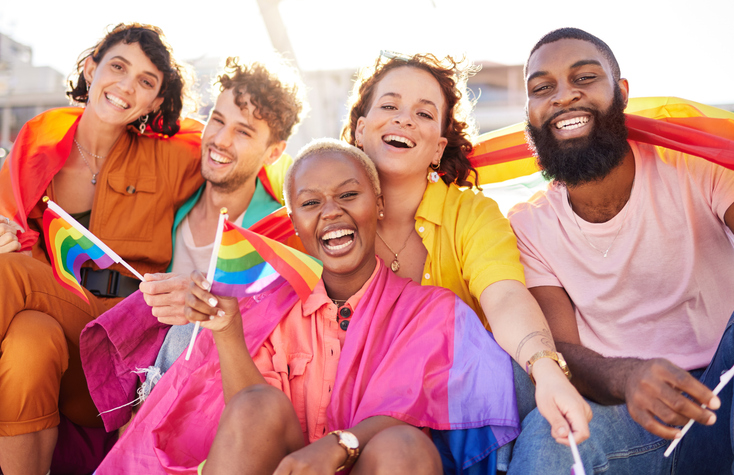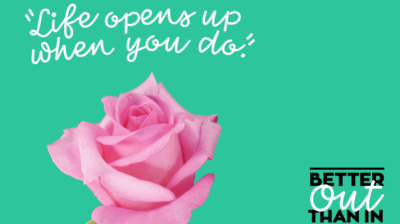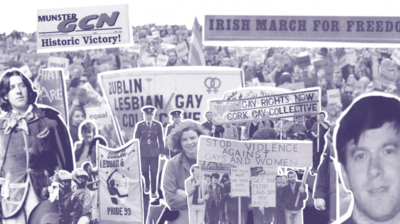My advice for supporting your black LGBTI+ friends
This writer talks about their friend’s experience coming out, and building up their self-confidence and self-esteem

The struggles with being black in the western world is a tale that has been well documented in movies and music. It is often highlighted in our political conversations especially when there are incidents of racism and police brutality. But being black and gay means facing struggles from both within and outside your community.
I became better aware of this when a very close friend of mine was struggling with his sexuality, and it was clear to see the strain this put on his mental health. Supporting my friend over the years has shown me some things we can all learn from, and ways we can better support our LGBTI+ friends.
Struggling with your faith
One of the biggest struggles for black LGBTI+ young people can be dealing with their faith. Unlike many young white people who have fallen out of love with the church, young black people, for the most part, remain religious. It’s no secret that the church, like other religious institutions, are some of the most anti-LGBTI+ in society. There was a view often preached in the pulpits that homosexual relations are sinful.
In his teens, my friend constantly struggled with his identity. He would go to mass and constantly pray not to feel what he did. After several years of a constant battle between his belief and his identity, he had to let his belief go, so he could have peace. This was not something he took lightly. Growing up, he often felt there was this part of himself he needed to keep hidden. It put a lot of pressure on his mental health and had a negative impact on his self-esteem and self-worth.
Becoming a lapsed Catholic and being away from that environment helped him to begin to rebuild his sense of self-worth. I am still proudly Christian, but I am very conscious that the church wasn’t there for him when he needed it. I think we need to find a better way to support LGBTI+ young people who are religious and struggling with their faith.
Racism and Homophobia
He always tried to have a positive view of society, choosing to believe that education and awareness can defeat discrimination and racism. Unfortunately life has not been so kind to him. He has lost a number of black friends over the years when he came out to them. Some have tried to act understanding but the relationships almost always collapsed. This was often a blow to his self-esteem, but over time this has given him a thick skin. My friend now keeps mostly to himself with very few close friends to talk to.
When he tried dating, he experienced a lot of racism. It was so blatant and that really surprised him. Being black and gay meant he didn’t feel accepted by some of the people he met, often making him lonely and depressed.
I think when a friend comes out to you, it’s important to give them time and space to tell you in a way they’re comfortable with. If you are religious yourself, it may be difficult to have that conversation, but it’s important to remember that if your friend is also religious, they are probably going through a tough time and struggling with their faith, so try to support them as best you can.
Becoming more comfortable and confident
When we first became friends in college, he was still struggling with this sexual identity at the time. He was anxious, very defensive and timid, with strong emotional walls that made it hard for people to get to know him as he didn’t want to get hurt.
I think going to university was liberating for him. He had the opportunity to figure out who he wanted to be, away from the watchful eyes of family and the people who knew him. At university, he took his time, coming out to a few close friends like me, before eventually having a go at dating using the usual dating apps.
It’s still a learning process for him. Despite my best efforts to encourage and support him he didn’t attend a single pride event organised by the university as he still felt nervous about being publicly out. But that’s ok, people take these steps in their own time and at their own pace. It’s important not to push too much, but make sure your friend knows you’re there to support them in their journey.
Looking after your mental health
It’s been over five years since we first met and he is doing a lot better now. He is no longer the lonely, anxious and depressed guy I originally got to know. He is much more confident in himself.
Dealing with his sexuality has been a huge learning curve for my friend. As his family and church community didn’t support gay people, he struggled with his mental health growing up. Having the right support system would have made a big difference to his mental health and self-confidence. Moving to university helped him to see the wider world and to better express his identity.
Coming out can be difficult for some people in the best of times, but particularly so if you have a religious background. Then throw in the additional challenges associated with being black and the mental health issues are heightened. I think the advice from my friend would be to find a good support network, make sure you’re looking after your mental health as best you can, and if possible, move away from toxic environments if necessary.
Feeling overwhelmed and want to talk to someone?
- Get anonymous support 24/7 with our text message support service
- Connect with a trained volunteer who will listen to you, and help you to move forward feeling better
- Whatsapp us now or free-text SPUNOUT to 50808 to begin.
- Find out more about our text message support service
If you are a customer of the 48 or An Post network or cannot get through using the ‘50808’ short code please text HELLO to 086 1800 280 (standard message rates may apply). Some smaller networks do not support short codes like ‘50808’.






